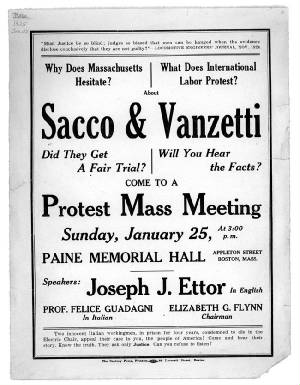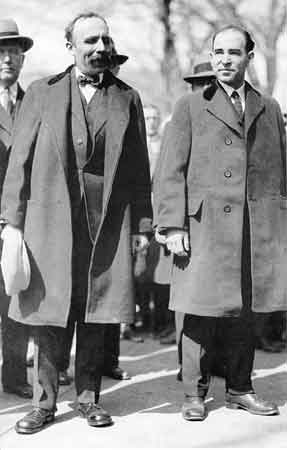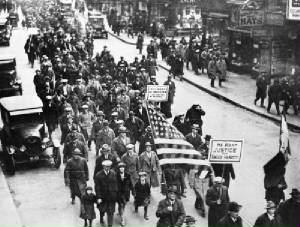|
|
 |
|
“This is a story
that talks about the injustice of prejudices in a society based on the social position that you occupy.”- Unknown Author
National History Day: The Individual in History
Robuil Basith, Quinton Hawkins, Tim Huang
Junior Website Division

|
| A protest flyer |
Nicola Sacco-
Sacco was born in Torremaggiore, Foggia, Italy on April 22, 1891 and emigrated to the United
States at the age of seventeen. In the United States he became a shoe worker and settled in Milford, Massachusetts. He soon
started working for a local shoe company, got married, and had a son. Later, he would also have a daughter.
Bartolomeo Vanzetti-
Vanzetti was born in Villafalletto, Cuneo, Italy on June 11, 1888. He emigrated to the United States at age
twenty. Vanzetti was a wanderer and moved from job to job and place to place. Vanzetti eventually became a fish peddler in
Plymouth, Massachusetts. He also tried very hard to learn the English language and shortly afterward learned how
to read. When he mastered these skills, he spent much of his time reading books about anarchy (a state of society without
government or law).
Both emigrated to the United States in 1908 but didn't meet each other
until 1917. They both were anarchists and followers of Luigi Galleani, a major 20 century anarchist also born in Italy and
also an immigrant to the United States. Sacco and Vanzetti were executed on August 23, 1927 because people believed that they
were responsible for the 1920 armed robbery and murder of Frederick Parmenter and Alessandro Berardelli, the guard and the
pay master of the shoe company that Sacco worked at in Braintree, Massachusetts. The police chief who apprehended Sacco and
Vanzetti was Michael Stewart. He believed that he had found the perfect suspects: poor Italian immigrants, who came to pick
up a broken gun. Sacco's gun was broken in the same spot and sent to the same repairman as the 32. Colt automatic that was
used for the Bridgewater hold up. Sacco and Vanzetti were found guilty of first degree murder and were sentenced to death.
People soon started to suspect that Sacco and Vanzetti may not have had a fair trial, whether they were guilty or not. Many
years after, people were still trying to clear the names of Sacco and Vanzetti for a crime they might not have committed.
The names, Nicola Sacco and Bartolomeo Vanzetti, were cleared, after decades of waiting, by former Massachusetts Govenor Mike
Dukakis.
|
 |

|
| "Bartolomeo Vanzetti, left, and Nicola Sacco" |
|
 |
|
'“But what good is the evidence and what good is the argument? They are determined to kill us regardless
of evidence, of law, of decency, of everything. If they give us a delay tonight, it will only mean they will kill us
next week. Let us finish tonight. I’m weary of waiting seven years to die, when they know all the time they
intend to kill us.”
--Sacco, August 22, 1927, fifteen hours before he and Vanzetti were executed'.

|
| A protest to save Sacco and Vanzetti |
|
|
 |
|
|
|
|
'"This is what I say: I would not wish to a dog or to a snake, to the most low or misfortunate creature of the
earth — I would not wish to any of them what I have had to suffer for things that I am not guilty of. But my conviction
is that I have suffered for things that I am guilty of. I am suffering because I am a radical and indeed I am a radical; I
have suffered because I was an Italian, and indeed I am an Italian; I have suffered more for my family and for my beloved
than for myself; but I am so convinced to be right that if you could execute me two times, and if I could be reborn two other
times, I would live again to do what I have done already.
I have finished. Thank you."
—Bartolomeo Vanzetti, to Judge Thayer, upon being sentenced to death, April 9, 1927' | | |
|
 |
|
|
|
|
|
|
|
 |

